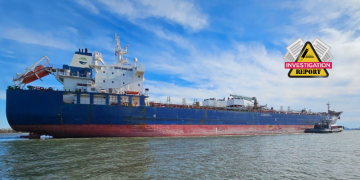The Seafarers Hospital Society (SHS) launched a discussion paper titled ‘Seafarers’ Health: On Course for a Culture of Care’ which establishes possible key performance indicators (KPIs) for ship owners and operators to measure the effectiveness of strategies aimed at improving seafarer health and wellbeing.
The discussion paper offers industry stakeholders practical steps to introduce cost effective and relevant interventions as part of a culture of care, while also utilising and developing further KPIs to track their effectiveness.
Sandra Welch, the CEO of Seafarers Hospital Society, who recently gave an exclusive interview to SAFETY4SEA about establishing a culture of care for seafarers, said:
The creation of focused KPIs allows for pragmatic interventions to be made and to track their progress over time, enabling a stronger business case for their implementation. The findings can also be used to inform conversations on industry progress in seafarer health
Divided into three categories, the discussion paper factors in key considerations such as the promotion of decent work (per the International Labour Organization), the maritime sector’s increasing need for transparency, and a growing global focus on environmental, social, and governance (ESG) factors.
#1 International Requirements for Seafarers’ Health – KPIs
- Frequency and nature of injuries on board leading to loss of more than three full working days.
- Frequency and nature of illness on board leading to loss of more than three full working days.
- Frequency of contact with maritime telemedical assistance services and outcomes.
- Frequency of medical evacuations and deaths on board with causes.
- Frequency of referrals for medical and dental advice in port with reasons.
- Frequency of repatriations for medical reasons.
- Frequency of termination of employment for medical reasons.
Organisations would need to assess impact on:
- The management of health and safety risks on board (SMS and MLC).
- Seafarer medical fitness assessments (ILO/ IMO Guidelines).
- Arrangements for the management of medical emergencies at sea per the MLC/ STCW covering medical care training, medical facilities and equipment, as well as communications with telemedical maritime assistance services (TMAS).
- Medical and dental referral in port (MLC). Ÿ Medical repatriation and rehabilitation (MLC).
#2 Health Promotion Activities – KPIs
- Measurable inputs such as increased healthy food options, exercise facilities, educational activities.
- Measured uptake of health and wellbeing programmes assessing the numbers/ proportions of participating
- Provision of support while ashore through seafarer access to performance data and personalised advice.
- Measurable outcomes such as Body Mass Index (BMI) control or exercise increase.
- Improved reporting of communicable diseases (without stigma) and reducing underreporting and misclassification of communicable diseases.
- Implementation of preventative measures such as vaccination of crew, allocation of seafarers in single cabins where possible, early treatment, and isolation of respiratory diseases to reduce and contain outbreaks.
- Institution of regular awareness-raising campaigns for the prevention of common respiratory infections, such as seasonal influenza, emerging diseases and other respiratory diseases.
- Education about risk, such as awareness campaigns for cancers. More detailed information on how best to develop health promotion activities may be obtained from a range of organisations such as SHS, ISWAN, maritime health advisers or P&I clubs.
Organisations would need to assess impact on their ability to offer:
- Education for seafarers about what can be done to prevent occupational injuries and ill-health.
- Information and advice from enhanced seafarer medical examinations, which must be delivered solely for the benefit of the seafarer and not form the basis for discriminatory actions relating to employment.
- Possibilities for physical fitness and mobility, such as facilities, individual recommendations, targets and competitions.
- Appropriate and acceptable nutritious food choices, general and individual advice on healthy weights, access to weighing facilities, and targets and competitions on weight management.
- Targeted disease prevention, such as dental health, diabetes, high blood pressure, cancers, etc.
- Reduction of communicable diseases such as respiratory diseases like influenza, COVID-19, infectious gastrointestinal illness, and sexually transmitted diseases
#3 Psychological Wellbeing – KPIs
- Benchmarks that can be inputted on the basis of current provisions for each of these aspects, with records of steps taken to improve quality.
- Confidential surveys of crew views on quality of life at sea and exit interviews with seafarers who are leaving to assess potential organisational shortcomings.
- Monitoring and investigations of complaints about conditions on board for recognised shortcomings.
- Developing and implementing either an Employee Assistance Programmes (EAP) and/ or Crisis Intervention Procedure (CIP) to confidentially support crew.
- Developing and implementing fatigue reduction programmes.
- Improving communication by ensuring all crew have a high level of fluency in the working language of the vessel, and by improving the communication and leadership skills of those in higher positions onboard/ on shore.
- Ensuring that crew have access to reliable internet connections so as to communicate with their loved ones at home.
- Promoting social activities in port consistent with the culture of crew, which can be carried out by masters and senior officers.
- Creating a clear and effective complaint procedure and confidential whistleblowing policy and procedure for reporting of bullying, harassment, workplace violence and sexual abuse.
Organisations would need to assess impact on their ability to offer:
- Security of employment, with safe working conditions.
- Reliable payment of fair wages, both to seafarer and as remittance to home.
- Short cycles of sea-time and leave (less than nine months).
- Skilled crew management, with prevention of harassment and recognition of good work.
- Lack of language barriers on board.
- Training of crew in mutual support.
- Minimisation of fatigue by limitation of overtime.
- Good crew mess facilities and accommodation.
- Open access to communication with home, family and friends.
- Family liaison points within the company.
- Access to external advisory and support services (which may be anonymous).
- Facilities and time for safe socialising when in port.
As we move beyond the added stresses and strains created by the pandemic, it is more important than ever that maritime employers take the health and wellbeing of their workforce seriously, particularly if we want to retain talent and attract new recruits
Captain Kuba Szymanski, SHS Chair and Secretary General of InterManager, concluded.
While companies further along their journey towards a culture of care may find themselves already scoring highly on these KPIs, others will just be at the beginning. Similarly, these interventions are merely a starting point from which industry stakeholders can begin to assess their long-term investments in seafarer health and welfare, the report mentions.





























































